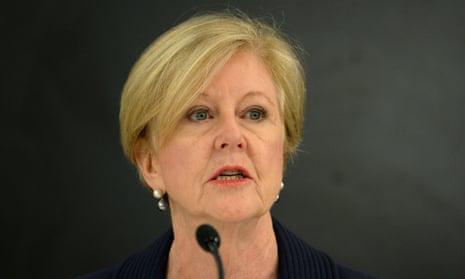Ten years ago the first report into children in immigration detention in Australia, A Last Resort?, resulted in every child in that situation being released.
Since then thousands of children have again been detained, as a matter of immutable policy, under the administration of both Labor and Coalition governments.
There are fewer now than before – 257 according to the immigration department’s latest figures, down from a peak of 1,992 in July 2013 – but some, like the 119 on Nauru and several on the Australian mainland, face indefinite detention, despite never being charged with a crime.
The introduction to The Forgotten Children, the Australian Human Rights Commission’s report on children in immigration detention released late on Wednesday, asks a plaintive question: “How have the gains that were so hard-fought … disappeared?”
If the author of The Forgotten Children, Professor Gillian Triggs, seeks an answer to her question, she need only look to the response to her report from the politicians charged with responsibility for those children.
In the aftermath of the report, long-awaited and delayed, most politicians of both stripes have completely ignored the subject at issue – the mandatory detention of children – and instead used the document as a cudgel with which to attack the other side.
Instead of beating each other around the head with the report, Australia – and the children it keeps in detention – would be better served if its politicians read it.
At issue is not whose fault mandatory detention is – the policy has bipartisan support – but the policy itself, and what else might more humanely address the issue of asylum seekers. For that, Australia needs to lift its eyes from its predictable and pointless political bellicosity.
Australia is not some rare butterfly in the problems it faces with people presenting at borders without visas, seeking asylum.
Today there are more displaced people in the world than at any time since world war two – some 50 million, half of them children – and most refugees are hosted in developing countries close to their own homelands.
Even at the peak of boat arrivals during 2012 and 2013, Australia’s problem was not significant, both in terms of international comparisons and the country’s capacity to deal with it. This fact has little to do with “policy settings”, despite Canberra’s rhetoric, and everything to do with geography: Australia is an island nation that shares no land borders, and is a long way away from the world’s conflicts.
The boats have not stopped.
They are being stopped – 15 turn-backs that are known of in the past 18 months – and the vessels continue their sorry carriage around the region, in various states of seaworthiness. Last year, 63,000 people boarded boats across southeast Asia, seeking sanctuary in another country. Most headed south from the Bay of Bengal. Most ended up in Malaysia and Thailand or Indonesia. Several hundred were turned back from getting to Australia. About 750 died or drowned along the way.
It is amply clear that the issue of asylum is not Australia’s problem. It is the world’s to deal with and one that will only grow in size and import as populations grow, conflicts emerge or expand, and climate change steadily or dramatically displaces millions.
Meanwhile, no other country – not Pakistan which hosts 1.7 million refugees, not Iran or Turkey which house more than 800,000 each – compulsorily detains children. In fact Australia enjoys the unhappy distinction of being the only country in the world that has a policy of mandatory detention of minors.
If Australia’s body politic could agree to a ceasefire on the question of asylum, if it could treat it as a humanitarian issue rather than one of national security, and if it could see it as a global problem to be soberly addressed rather than a domestic battle to be won, this country could lead the region and the world in addressing the issue.
But for a decade politicians of all persuasions have failed Australia on asylum, and the thousands of children they’ve held in detention. In their continued intransigence they will all but guarantee Australia will be in this situation again, asking again: “Where did it all go wrong?”

Comments (…)
Sign in or create your Guardian account to join the discussion